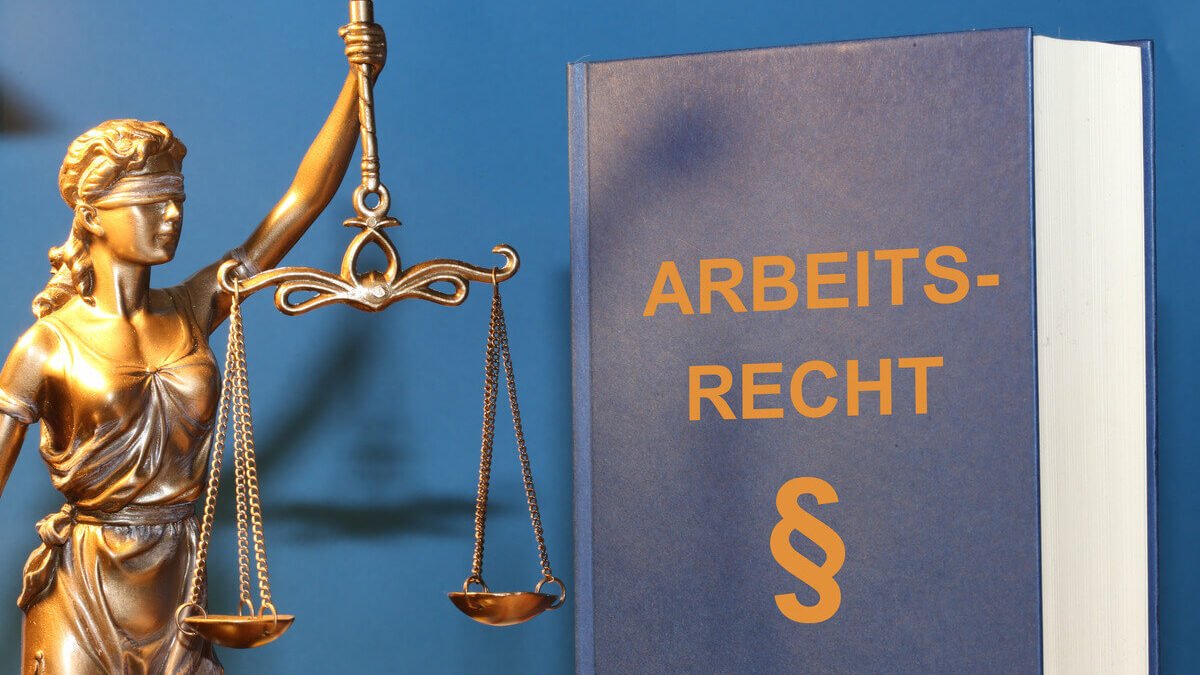

The “action for unfair dismissal” is the most important tool for employees to defend themselves against unfair dismissal. It must be filed with the competent labour court within three weeks of receiving the written notice of dismissal. An action for unfair dismissal in Germany is standard procedure and by no means a ‘hostile act’. Most actions for unfair dismissal are settled within 1-3 months. The chances of success of an action for unfair dismissal are generally good for employees. Our article deals with the requirements for an action for unfair dismissal, the procedure, the chances of success (especially the amount of severance pay in the event of an action for unfair dismissal), whether you always need a lawyer for an action for unfair dismissal, and what costs you can expect.
Do you need help with German labor law?
Get a free initial consultation now – with an expert on German labor law!
Key takeaways
- In Germany, hundreds of thousands of actions for unfair dismissal are filed every year.
- Employees must file an action for unfair dismissal within three weeks of receiving notice of dismissal. If this deadline is missed, the protection against dismissal is lost.
- The procedure for an action for unfair dismissal is always the same, and most actions are settled within 1-3 months.
- Success rates are high: According to our estimates, at least 70-80% of all actions for unfair dismissal are successful for employees.
- The probability of receiving severance pay is significantly higher in the case of a lawsuit than in the average case of termination by the employer. This usually justifies the costs of a lawyer
Contents
What is an action for unfair dismissal?
An action for unfair dismissal is a court procedure in which an employee takes action against dismissal by their employer. It is an important instrument for protecting employees against unjustified dismissals. The labour court examines whether the dismissal is justified and whether all legal requirements have been met.
An action for unfair dismissal in Germany is standard procedure and by no means a ‘hostile act’. It’s how the system is designed. If you don’t file within three weeks, your protection is gone, which is why hundreds of thousands of employees go to the labour courts every year and usually walk away with a severance settlement. So, filing is not the “nuclear option”, just the standard route the law expects you to take.
Technically, the objective of an unfair dismissal claim is to have the dismissal declared invalid and keep the job. In reality, however, the outcome is almost always a negotiated severance in return for ending the employment relationship.
Unfairly dismissed in Germany?
Check your severance pay now – you have only 3 weeks to preserve your severance package!
Requirements and procedure
The substantive requirement for an action for unfair dismissal is the existence of a dismissal by the employer.
The employee must assert in the action that this dismissal is “socially unjustified” or legally invalid for other reasons. In addition, the action must be filed with the labour court within three weeks of receipt of the written dismissal. After expiry of the three-week period, the dismissal is deemed effective – even if it was originally unlawful.
Typical steps in an action for unfair dismissal
A typical action for unfair dismissal proceeds as follows:
- Legal assessment: First, the lawyer assesses the facts, evidence and legal situation together with his client, in particular the validity of the dismissal and the likelihood that an action for unfair dismissal will result in a (higher) severance payment for the client.
- Filing the statement of claim: If the lawyer and client come to the conclusion that it is worthwhile to file an action for unfair dismissal, the lawyer will file a statement of claim with the labour court. This action must be filed with the competent labour court within three weeks of receipt of the written dismissal. After the three-week period has expired, the dismissal is deemed effective.
- Conciliation hearing and negotiation of severance pay: After the claim has been filed by the lawyer and served on the employer by the court, a conciliation hearing is held. As the name suggests, the aim of the conciliation hearing is to reach an amicable agreement between the two parties. The conciliation hearing usually takes place three to four weeks after the claim is filed. Here, a settlement is usually negotiated, which normally includes severance pay for the employee. This allows the legal dispute to be resolved quickly.
In more than 80% of unfair dismissal proceedings, this is successful, with the employee receiving severance pay and the employment relationship being terminated by mutual agreement.
Further steps (depending on willingness to reach an agreement)
The following steps depend on the willingness of the parties to reach an agreement:
- Exchange of further written pleadings and chamber hearing (optional): In the few cases where the parties are unable to reach an agreement in the conciliation hearing, the unfair dismissal proceedings continue. The employment court sets a new hearing date, the chamber hearing. This hearing is usually about three to four months later. During this time, the lawyers often write further pleadings to support their position.
- Judgment (optional): The chamber hearing is the actual court hearing. The court will again attempt to reach an agreement. If this is not possible due to the parties’ unwillingness to reach an agreement, the employment court will issue a decision by way of a judgment.
If necessary, an appeal and revision may follow if one of the parties does not accept the judgment. However, only about 3% of unfair dismissal proceedings go to the second instance.
Action against unfair dismissal: Prospects of success and severance pay
The chances of success of an action for unfair dismissal are generally good for employees – although this always depends on the individual case, of course. Success for the employee means that they receive a (high) severance payment; the employment relationship is terminated.
According to our estimates, at least 70-80% of all actions for unfair dismissal are successful for the employee. The probability of receiving severance pay is about four times higher in the case of a lawsuit than in the average case of termination by the employer. On average, severance payments amount to 1.05 gross monthly salaries per year of employment.
Severance payments are higher the more reasons there are that could render the termination invalid.
Formal reasons for the invalidity of termination
On the one hand, there are formal reasons that can render a termination invalid:
- Written form of termination: Terminations must be made with a handwritten signature.
- Ambiguous wording: Termination must be clearly recognisable as such.
- No right to terminate: Termination must be issued by a person authorised to do so.
- Receipt of termination: Termination must be received by the other party, e.g. by personal delivery or by posting in the letterbox.
- Involvement of the works council: The works council, if there is one, must be consulted before any termination.
- In individual cases also failure to state reasons for termination: Reasons for termination only need to be stated in special cases (e.g. trainees, pregnant women).
- Failure to comply with the notice period: Extraordinary termination must be declared within two weeks of becoming aware of the reason for termination.
- Special protection against dismissal: Special procedures apply in some cases to employees with special protection against dismissal.
Substantive grounds for the invalidity of the dismissal
On the other hand, the labour court will of course also examine substantive grounds:
- Within the scope of the Unfair Dismissal Protection Act, the prospects of success of an action for unfair dismissal are good, as the law provides for a comprehensive review of the dismissal by the labour court in favour of the employee. This means that a dismissal is only legally valid if it is socially justified. The employer must prove that the dismissal was made for behavioural, personal or operational reasons that meet the legal requirements.
- However, even employees who are not covered by the Unfair Dismissal Protection Act are protected against unfair dismissal. For example, protective provisions for certain groups of people such as pregnant women, parents on parental leave or people with severe disabilities may apply (special protection against dismissal). In such cases, the chances of receiving a high severance payment (or continued employment) are particularly high because the standards of case law regarding the validity of a dismissal are very strict.
The courts also have strict requirements for extraordinary (termination without notice) dismissals. In the case of termination without notice, there are particularly good reasons to file an action for unfair dismissal (including the threat of a waiting period for unemployment benefits).

How much severance pay are you entitled to? Calculate now!
- Calculate your individual severance pay for free
- Calculation of the standard payment up to a very high settlement
- Get a strategy to maximise your severance pay
Action against unlawful dismissal: a lawyer is advisable
Current figures show that almost all employees are represented by a lawyer in unfair dismissal proceedings before the Labour Court. 83% of all chamber appointments on the employee side are represented by lawyers. However, a lawyer is not mandatory in an action for unfair dismissal. There is no obligation to hire a lawyer in the first instance before the labour courts. In theory, you can also file an action for unfair dismissal without a lawyer.
This saves on legal fees, but may have a negative impact on the amount of severance pay. This is because a lawyer specialising in employment often has years of negotiating experience and can also find hidden flaws in a dismissal. For laypeople, it is difficult to assess in individual cases whether and what protection against dismissal exists. It is also difficult to determine whether the dismissal is formally invalid, for example, because the ‘wrong signatures’ are on the dismissal letter. The lawyer will also clarify in advance whether your legal expenses insurance covers the costs.
They are experienced negotiators who go into negotiations with an ‘unbiased’ perspective. They can deal with your employer or their legal representatives in a completely different way than an employee can. Finally, there is another very practical reason why you can ‘get more’ with a lawyer. Many employers are more willing to reach an out-of-court settlement when employees are represented by a lawyer. And you will notice this in the amount of the severance payment.
Use expert knowledge when in doubt
Ultimately, however, this also depends on how well employees can present the company situation and the reason for dismissal. As a rule, however, we advise against trying to act as your own lawyer in an action for unfair dismissal. In most cases, even taking into account the legal fees, you will get more out of having an experienced expert on your side.
Action for unfair dismissal: Costs
The costs of an action for unfair dismissal primarily include court and lawyer’s fees. These must be considered separately, even if both are based on the ‘value in dispute’:
- The value in dispute in actions for unfair dismissal is usually three gross monthly salaries. Our article on the value in dispute also contains tables on the value in dispute in actions for unfair dismissal and a cost calculator.
- A special rule applies to legal fees in employment law: the general principle of ‘whoever loses pays’ is only applicable to a limited extent in employment law. There is no entitlement to reimbursement of your own legal fees by the other party. This means that even if the employee wins the case, they usually have to bear their own legal fees. Unless otherwise agreed in a settlement or special agreement.
- There is another special feature of court costs in the first instance before the labour courts. If a settlement is reached in court, no court costs are incurred.
In many cases, legal expenses insurance covers the lawyer’s fees, provided that the employee has such insurance. However, employees with limited financial resources who do not have legal expenses insurance can apply for legal aid in the event of an action for unfair dismissal. This is granted if the employee can prove that they are unable to bear the costs of the proceedings due to their financial situation. In this case, the state bears the costs of the proceedings, which provides important support for socially disadvantaged employees in particular.
Do you need help with German labor law?
Get a free initial consultation now – with an expert on German labor law!
Frequently asked questions (FAQ)
Do you need help with German labor law?
Get a free initial consultation now – with an expert on German labor law!




